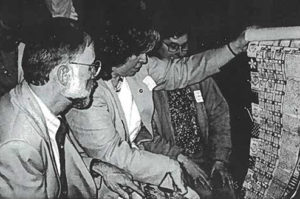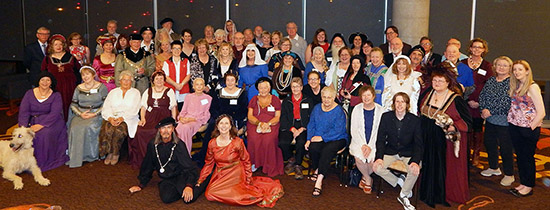The Sixtieth Anniversary of the American Branch

The American Branch of the Richard III Society turned 60 years old this year. The branch was founded by Arthur Noel Kincaid in 1961. Kincaid would later leave the US to continue his studies in Europe and became a naturalized British citizen in 1974. In Ricardian circles, he is perhaps best known for a new edition of Sir George Buck’s classic work: The History of King Richard the Third (1619). Edited with an Introduction and Notes by Arthur Noel Kincaid (1979). Kincaid’s edition was based on an early manuscript, not the corrupted version published by Buck’s great-nephew in 1646. This early manuscript, along with Kincaid’s helpful notes, helped to answer many of criticisms surrounding the corrupted edition.
The American Branch of the Richard III Society was not the first Ricardian organization established in the United States. The Friends of Richard III, Inc. was founded in 1954 by stage actor Alexander Clark. The first official meeting of the Friends was in March 1955. The Friends drew in many celebrities, including Helen Hayes, Tallulah Bankhead, Alfred Lunt, Lynne Fontaine, Pat Weaver (president of NBC), John Gielgud, Robert Montgomery, Frances Tannehill and Salvador Dali. The Friends had a major media coup in December 1955 during a nationally broadcast radio interview featuring both Clark and Sir Laurence Olivier. During the interview, Olivier made this stunning statement about King Richard III: “There’s no reason to suppose that he killed those babies in the Tower.” The Friends would merge with the American Branch in 1966.
When A. N. Kincaid left for Europe, leadership of the American Branch went to William “Bill” Hogarth. Hogarth joined the American Branch in 1963 and when he became co-chairman in 1965, American Branch membership stood at just twelve members. Bill Hogarth would serve in leadership positions in the American Branch until 1985. He is sometimes called the American Branch’s second founder since it was under his leadership and influence that the American Branch incorporated as a non-profit corporation, The Richard III Society, Inc., in late December 1968. Hogarth had a desire to establish a graduate fellowship, and was instrumental in encouraging Bill and Maryloo Schallek to establish the scholarship fund that still exists today. The Schallek Fellowship was established by William B. and Maryloo Spooner Schallek as a gift to the American Branch, and is currently administered by the Medieval Academy of America: “The fellowship supports an advanced graduate student who is writing a Ph.D. dissertation in any relevant discipline dealing with late-medieval Britain (ca. 1350-1500). The $30,000 fellowship helps defray research and living expenses for the equivalent of an academic year of study.” In addition, the Schallek fund also supports five $2,000 dissertation awards annually.
Another American Branch vignette supporting research was an effort led by Dr. Sharon Michalove to hold a series of scholarly conferences at the University of Illinois. The Branch funded conference expenses for the international medievalists who came to give papers, enabling leading British academics, as well as many American scholars and American Branch members, to join together and exchange ideas. Dr. Michalove commented on this time:
“One of the things I am so grateful for is the support that the American Branch has given to scholarly pursuits. When I proposed a series of scholarly conferences to be held at the University of Illinois, the Branch funded conference expenses for the international scholars who came to give papers. Each conference was held over several days and all the sessions were consecutive so that all the participants could take part in all the sessions. The residential setting of two of the conferences at the University’s Allerton House brought scholars and Society members together in a collegial environment. Enabling leading scholars like Colin Richmond, Ralph Griffiths, Michael Jones, Tony Pollard, Peter Fleming, as well as many American scholars, underscored the commitment to the research mission of the Society and raised the profile of the Branch in the academic community.”
Numerous officers and members of the American Branch have come from academic backgrounds, including Dr. Morris McGee, Dr. A. Compton Reeves, Dr Lorraine Attreed and Dr. Michalove. Dr. Reeves frequently presided over the Fifteenth-Century English History sessions at the annual International Congress of Medieval Studies at Western Michigan University in Kalamazoo, Michigan. American Branch members, both academics and amateur historians, have presented at the Congress. One such presenter was Laura Blanchard, the American Branch’s former webmaster (in addition to serving in numerous Branch leadership positions). Laura was also instrumental in the Free Library of Philadelphia Rare Book Department’s MS Lewis E201 (c. 1461-64, commonly called “Edward IV Roll”) preservation project. The American Branch made significant financial contributions in support of this endeavor. (For more on this, see our Edward IV Roll page.) A visit to see the Edward IV Roll in person was on the schedule for the American Branch’s 2020 General Membership Meeting (GMM) in Philadelphia. However, when that event was cancelled because of the pandemic, the Branch took advantage of Zoom to hold a Virtual GMM attended online by over forty members (more on that GMM below).
More than thirty American Branch members from sixteen different US states travelled to the UK for the historic reinterment of King Richard III in 2015. The American Branch contingent was led by Chair Jonathan Hayes (who later served as a Vice President of the parent Society in the UK). A key event for the Branch was hosting a cocktail reception for those involved in the Looking for Richard Project. American Branch attendee Sally Keil (now serving as the Missing Princes Project coordinator in the US) described the experience as a whirlwind of events, including lectures at the University of Leicester, the aforementioned cocktail reception, and two Compline services at Leicester Cathedral. She described the second Compline service as particularly stirring: “The Richard III Society held its own service the next evening. This time there was no filming going on so the beauty of the flickering candles and the stillness of the Cathedral gave us all time to quietly reflect. The service was very moving: it was for King Richard, conducted by Ricardians.”
In 2016, the American Branch had an extremely memorable GMM in Denver, Colorado, attended by 65 members. The highlight of the GMM was the enthralling keynote presentation given by Dom Smee (Secrets of The Dead: Resurrecting Richard III, 2014) and his mother, Christina Smee, on their experiences with Dom being recruited as “Richard III’s body double” and on her experience as a historical re-enactor at the Bosworth Battlefield Center. During the banquet that evening, we were treated to an amazing live concert by The Legendary Ten Seconds, led by Ian Churchward.

In 2020, the effects of the pandemic caused the cancellation of the GMM in Philadelphia. However, through the resourcefulness, tenacity and hard work of Cheryl Greer and Susan Troxell, the American Branch still had a GMM, albeit a virtual event. The guest speakers at this virtual GMM were exceptional: Peter and Carolyn Hammond (Richard III Society, CLG, President and Vice President, respectively), Matthew Lewis (now the current Chairman of the Richard III Society, CLG) and Sally Keil (US coordinator for the Missing Princes Project).
In addition to those noted above, an American Branch profile would be incomplete without mentioning the following Ricardians, each of whom has provided exceptional service to the Richard III Society, American Branch over the years (far from a complete list). Most of these are recipients of the American Branch’s Dickon Award: Peggy Allen, Dianne Batch, Bonnie Battaglia, Carol Bessette, Pam Butler, Alan O. Dixler, Jeanne Faubell, Judie Gall, Elizabeth (Libby) Haynes, Martha Hogarth, Joyce Hollins (Hiller), Deborah Kaback, Helen Maurer, Tamara Mazzei, Linda McLatchie, William and Amber McVey, Mary Miller, Roxanne Murph, Nita Musgrave, Judith Pimental, Eileen Prinsen, Carole Rike, Yvonne Saddler, Myrna Smith, William Snyder, Joan Szechtman, and Maria Torres.
If you would like to share your memories of the Richard III Society, American Branch for possible inclusion in a future issue of the Ricardian Register, please send them to me at membership@r3.org.
by Wayne Ingalls, Membership Chair, American Branch
